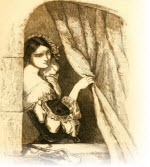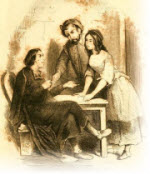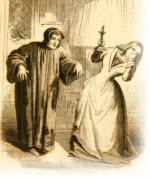
Boccaccio Decameron
We must take the ten days' holiday as it is painted: a gay and entrancing record of a fortunate and brilliant summer vacation, every one of its hundred pictures united with the rest by a delicate tracery of flowers and landscape, with bird-songs and laughter, bits of tender and chaste by-play—for there were recognized lovers in the company; and when this is conceived in its entirety, we must set it in the massive frame of terrible gloom of the great plague, through which Boccaccio makes us look at his picture. And then the frame itself becomes a picture; and its ghastly horror—the apparent fidelity of the descriptions, which makes one feel as if he had before him the evidence of an eye-witness—gives a measure of the power of the artist and the range of his imagination, from an earthly inferno to an earthly paradise, such as even the "Commedia" does not give us. In this stupendous ensemble, the individual tales become mere details, filling in of the space or time; and, taken out of it, the whole falls into a mere story-book, in which the only charm is the polish of the parts, the shine of the fragments that made the mosaic. The tales came from all quarters, and only needed to be amusing or interesting enough to make one suppose that they had been listened to with pleasure: stories from the "Gesta Romanorum," the mediaeval chronicles, or any gossip of the past or present, just to make a whole; the criticism one might pass on them, I imagine, never gave Boccaccio a thought, only the way they were placed being, important. The elaborate preparation for the story-telling; the grouping of them as a whole, in contrast with the greater story he put as their contrast and foil; the solemn gloom, the deep chiaroscuro of this framing, painted like a miniature; the artful way in which he prepares for his lieta brigata the way out of the charnel-house: these are the real "Decameron." The author presents it in a prelude which has for its
scope only to give the air of reality to the whole, as if not only the plague, but the "Decameron," had been history; and the proof of his perfect success is in the fact that for centuries the world has been trying to identify the villas where the merry men and maidens met, as if they really had met.
"Whenever, most gracious ladies, I reflect how pitiful you all are by nature, I recognize that this work will in your opinion have a sad and repulsive beginning, as the painful memory of the pestilence gone by, fraught with loss to all who saw or knew of it, and which memory the work will bear on its front. But I would not that for this you read no further, through fear that your reading should be always through sighs and tears. This frightful beginning I prepare for you as for travelers a rough and steep mountain, beyond which lies a most beautiful and delightful plain, by so much the more pleasurable as the difficulty of the ascent and passage of the mountain had been great. And as the extreme of pleasure touches pain, so suffering is effaced by a joy succeeding. To this brief vexation (I call it brief, as contained in few words) follow closely the sweets and pleasures I have promised, and which would not be hoped for from such a beginning if it were not foretold. And to tell the truth, if I had been able frankly to bring you where I wished by other way than this rough one, I had willingly done so; but because I could not, without these recollections, show what was the occasion of the incidents of which you will read, I was obliged to write of them."

The elaborate description of the plague which follows, shows not only Boccaccio’s inventive power,—as being, like that of Defoe of the plague of London (which is a curious parallel to this) altogether imaginary, since the writer was at Naples during the whole period of the pestilence,—but also that it was a part indispensable of the entire scheme, and described with all its ghastly minuteness simply to enhance the value of his sunshine and merriment. He was in Naples from 1345 until 1350, without any other indication of a visit to Florence than a chronological table of his life, in which occurs this item:—"1348, departs in the direction of Tuscany with Louis of Taranto:" as if either a prince on his travels would take the plague in the course of them, or a man so closely interested in the events of the time at Naples, and in the height of his passion for Fiammetta, — the separation from whom he had hardly endured when earlier (1345) he was separated from her by his duty to his aged father,—would have chosen the year of the pestilence, when every one who could, fled Florence, to return there; and we find him in May, 1349, in Naples, in the full sunshine of Fiammetta's favor, and remaining there until his father's death in 1350.
Advertisements:



Site Updates | Privacy Policy | Site Map | About
This is a website about the Decameron.